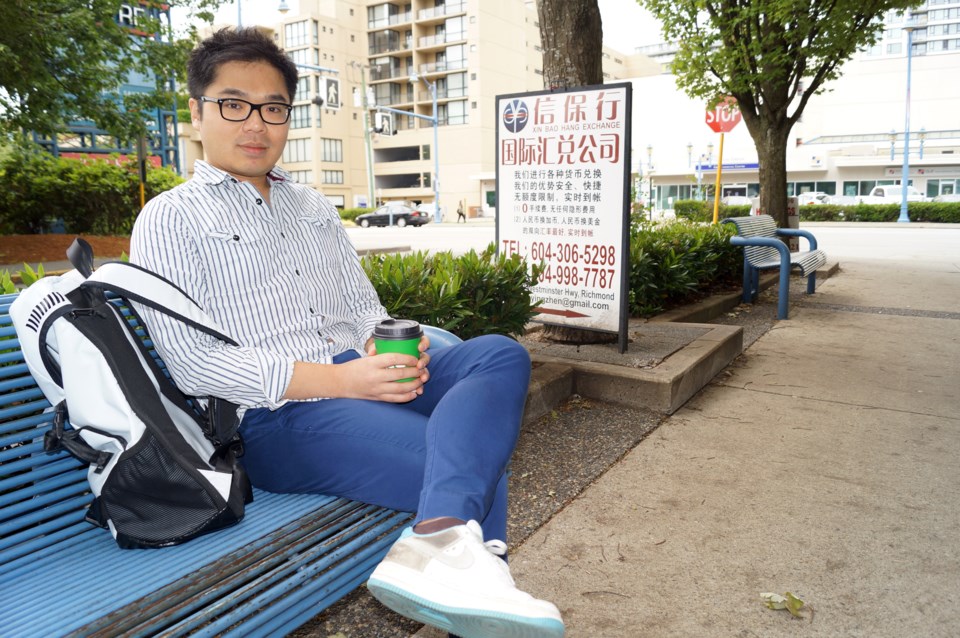When Ken Tin Lok Wong recently perused Richmond streets for a place to work out, he came across a new fitness centre near the Richmond Olympic Oval advertising in simplified Chinese.
Consider it a tipping point for Wong to contact the Richmond News to discuss a wrinkle in the great, infamous foreign language sign debate not often observed in non-Chinese speaking circles.
“The concern is traditional Chinese is being marginalized in the sense that the People’s Republic of China, their regime, believes that they are the authentic Chinese culture,” explained Wong.
While municipal records show the sign debate was put on the hot plate in the late 1990s — following an influx of Hong Kongese, such as Wong, 36 — it has come to a raging boil over the past five years with a new wave of Chinese immigrants — this time from Mainland China.
“We’re very much two different communities. Three different communities if you count Taiwan,” explained Wong.
The issue, noted Wong, not only shows divisiveness between Chinese and non-Chinese, but also from within the Chinese community.
To a non-Chinese speaker, Chinese signage — from business storefront ads to real estate pamphlets and service vans displaying little to no information in English — may appear the same. But it is not, noted Wong. And the takeover of simplified Chinese, invented and used in Beijing-controlled China, has roots in Chinese politics and culture, which are reverberating throughout Richmond.
Wong said he’s concerned the new wave of immigrants are not integrating as well as the Hong Kong diaspora did. And while he recalls the “monster home” debates of the early 1990s, this time around he sees Mainland Chinese immigrants having a much higher community profile, particularly in real estate, and seemingly ubiquitous simplified Chinese signage is a symptom of this.
“With foreign language signs, it is definitely a display of belonging. We’re here and we want to make our voice heard,” at the peril of other cultures and Canadian values, said Wong.
“Turning a blind eye and not catering to those who don’t speak the language, I think, is just a passive way to deal with (and avoid) potential assimilation,” said Wong.
“I don’t want to single out people from the PRC. But there’s a different mentality,” he added.
Part of that may be because newer Chinese immigrants are much wealthier than older ones. As an immigration consultant, Wong has witnessed the impact of investor immigrants, who can effectively buy Canadian citizenship for an interest-free loan to the government. Furthermore, many people are choosing to remain permanent residents as opposed to becoming Canadian. And the choice to travel between Canada and China for business reasons remains a popular one.
“They are not assimilated as easily,” said Wong, who has observed the back-and-forth debate at city council as to whether a bylaw should mandate English on signs.
Despite his strong feelings that his own Hong Kong culture is being absorbed by Communist influence, both here and abroad, he leans toward more education for newcomers, in order to protect basic fundamentals of freedom.
“It’s a double-edged sword, definitely. Canada being a country made up of immigrants, there are certain core values we need to uphold. But other than that, we have the privilege as immigrants to retain our culture and heritage — but on the basis of multiculturalism; which means we need to have some grounding in official languages in order to do whatever you’d like to while at home.”
But education should be swift and time is ticking as the city tilts toward becoming a “ghetto,” said Wong.
“My life revolves around Richmond. You get really boxed in here. The more you live here the less you feel how problematic this place could become. But I think the city is already problematic to begin with,” said Wong, concerned about the in-and-out nature of many new residents.
“You go to a restaurant in the middle of the afternoon and it’s packed. Where did these people come from? Is anyone working? Where did the money come from?”



